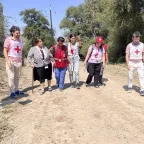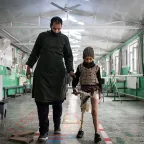Our Fundamental Principles
Humanity, impartiality, neutrality, independence, voluntary service, unity and universality: these are the Fundamental Principles that guide and define our work. The seven Fundamental Principles …
Humanity, impartiality, neutrality, independence, voluntary service, unity and universality: these are the Fundamental Principles that guide and define our work. The seven Fundamental Principles …

Calling for humanity to be upheld in war The Global Initiative to Galvanize Political Commitment to International Humanitarian Law Despite a global consensus supporting the Geneva Conventions, …
Mirjana Spoljaric Egger President Prior to taking up the Presidency of the ICRC in October 2022, Ms. Spoljaric served as the United Nations Assistant Secretary-General, Assistant Administrator of the …
When violations of international humanitarian law (IHL) occur, states are under an obligation to prosecute alleged offenders. Domestic courts therefore play an important role in enforcing IHL and …
Under international humanitarian law, children affected by armed conflict are entitled to special respect and protection. Highlight Children should be at school, not at war From our archives: …

Autonomous weapons are not a work of science fiction from a distant dystopian future. They are an immediate cause of humanitarian concern and demand an urgent, international political response. …

International humanitarian law (IHL) includes provisions to protect people with disabilities during times of armed conflict and other violence. Highlights ICRC preparing for major expansion of sports …

The widespread and poorly regulated availability of weapons facilitates violations of international humanitarian law and hampers the delivery of assistance to victims. Strengthening and enforcing …

Every detainee deserves to be treated with dignity and fairness, regardless of the reason for their arrest and detention. Protecting and assisting people deprived of their liberty Ensuring respect …

Everybody has a right to health care – even in war. We don’t take sides, and we will always uphold our principles of humanity, neutrality, impartiality and independence in the course of our work. We …

Try one of the following resources:
Created in 1863, the ICRC library, alongside the ICRC archives, provides an indispensable documentary reference on the organization itself and international humanitarian law.
International humanitarian law is based on a number of treaties, in particular the Geneva Conventions of 1949 and their Additional Protocols, and a series of other instruments.
Customary international humanitarian law consists of rules that come from "a general practice accepted as law" and that exist independent of treaty law.